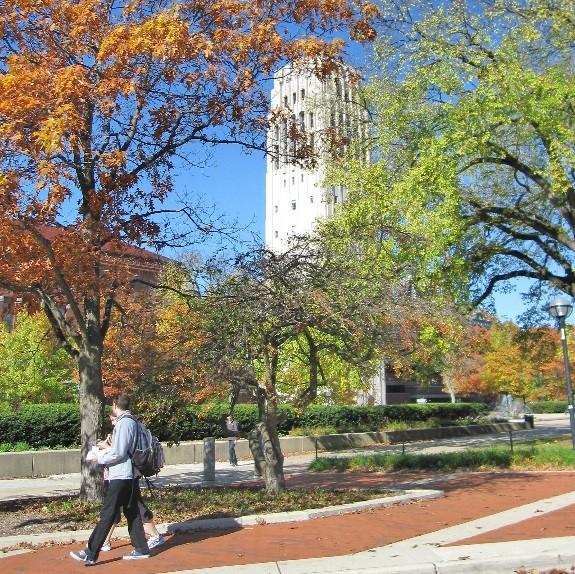Why get immunized?
College students should be immunized because:
- Vaccines are a very effective way to prevent infectious diseases
- Immunization protects everyone: other students on campus and a little sibling or grandma at home
- Infectious diseases such as pertussis (whooping cough) appear in the campus community
- Students often live and attend classes in close quarters
- Students initially tend to be immunologically naïve, meaning they haven't been exposed to some illnesses (it's the college version of what happened when your child went to kindergarten)
- Your student does not have time to be sick. The flu, for example, can derail students for a week or more, and at U-M, that can set students back academically
What’s recommended?
The US Centers for Disease Control and Prevention (CDC) recommends that college-age individuals be immunized against:
- Flu (annually)
- Hepatitis A and B
- Human papilloma virus (HPV)
- Measles, mumps, and rubella (combined as MMR)
- Meningitis (there are two types of vaccine)
- Polio
- Tetanus, diphtheria, and pertussis (combined as Tdap)
- Varicella (also known as chicken pox)
How to get immunized on campus
- To schedule an appointment, students should call 734-764-8320
- Students can get immunizations at University Health Service for a fee
- They can start or complete a series of vaccines
- They can also get Immunizations for Travel
- Some vaccines are relatively expensive, but some are not covered by students' health service fee so do check whether a vaccine is covered by your health insurance
How to stay healthy
In addition to getting vaccinated, U-M encourages students to take further steps to prevent illness. Following the steps below can protect everyone, including other students on campus and a little sibling or grandparent at home.
- Wash hands - see Wolverines Wash
- Cover coughs and sneezes
- Avoid sharing saliva
- Get adequate sleep, eat fruits and vegetables and exercise
- Avoid contact with people who are sick, if possible
- Stay home when ill to reduce the spread of illness
You can help by asking your student how you can support them from afar, during an illness or otherwise. One way is to check in with your student in a holistic way. You may want to use the U-M Model of Personal Well-being to guide conversation. The model includes mental/emotional, environmental, social, spiritual, occupational, intellectual, financial and physical dimensions of well-being.
For more information, please see these webpages for students:
- Nurse Advice by Phone
- I'm Sick! What Should I Do? Suggestions for Colds and Flu
- Take Care of Yourself and Fellow Wolverines!
- Tips for Academic Success if You are Sick or Injured
Skip the flu
Annual flu shots are the #1 most effective means to avoiding the flu. Students can easily get their flu shots on campus, either at UHS by appointment or during walk-in clinics, often available in residence halls.
The Gardasil-9 vaccine protects against nine strains of HPV, including those types that most commonly cause cancers and genital warts. The CDC recommends the vaccine for both males and females through age 26. Students from countries where HPV vaccine is not available may be especially interested in this vaccine. For more information, see CDC Vaccine Information Statement.
What about meningitis B vaccine?
Bacterial meningitis is a serious illness that can hit quickly and can be life-threatening. The standard meningitis vaccine does not protect against the meningitis B strain, which causes 1/3 of meningitis cases. Fortunately, a relatively new vaccine protects against Meningitis B.
Current CDC guidelines state:
- Meningitis B vaccine is optional for healthy young adults, and people ages 16-23 years old can get the vaccine, preferably between the ages of 16 and 18
- Certain young people should be immunized against meningitis B due to existing health issues
The CDC also recommends immunization for people at risk because of a meningitis B outbreak. Several college campuses have had to implement measures against meningitis B outbreaks. In the unlikely event of an outbreak at U-M, the university would implement a planned response that includes immunization.
On campus, University Health Service (UHS) is supportive of students getting the meningitis B vaccine. For more information, see the CDC Vaccine Information Statement.
To help Student Life continue making a difference in students' lives, please consider making a gift.

